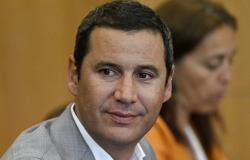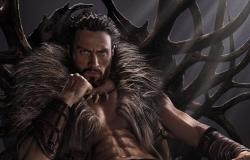On the first date of the “This Is Not a Drill” tour in Europe, Roger Waters brought to Portugal an imposing and opulent show, in which the apparatus of audiovisual production manages the miracle of not overshadowing the music. On stage with eight musicians, the man from Pink Floyd offers a concert divided into two parts, with an interval in the middle, and a strong conceptual component and – to no one’s surprise – politics. In front of a packed Altice Arena, on the first of two sold-out nights in that room, the English veteran criticized several world leaders, but ended up preferentially using the (really) giant screens to get the message across. When he sat down at the piano for the first time, to present the song he wrote during confinement, ‘The Bar’, he explained the importance of a “safe” place like this – a bar, or a cafe – where we can meet “with friends or strangers” and talk. “The most important thing is to talk,” he defended. “About Ukraine, but also other things,” he added, somewhat vaguely. Certainly aware of Roger Waters’ positions on the invasion of that country, the public hesitated in the reaction, and the two or three seconds that followed were the closest to silence we had at the Altice Arena, this Friday night. Our host in this imaginary bar ended up, however, not developing the subject, only returning to it near the end, before playing the last song of the last album he recorded with Pink Floyd: ‘Two Suns in the Sunset’, from the album “The Final Cut”, from 1983. “We have never experienced such a dangerous moment”, he said then, attributing the alarmism “to America, Russia, Ukraine and all that bullshit” (and asking the public if Portugal is part of of NATO).
The warning, let it be said in support of the truth, is given right at the start of the show (which started half an hour later than scheduled, at 21:30). “If you’re one of those people who love Pink Floyd but can’t stand Roger’s political opinions, you can go to the bar”, is heard seconds before the Altice Arena plunges into the dead green of a destroyed city, an almost apocalyptic scenario projected on the screen who, during the opening with a soaring version of ‘Comfortably Numb’, divides the stage in four. Each ‘cardinal point’ of the room is thus entitled to see only part of the band, until, with the first sighting of the famous flying pig, the screen also raises its camp, letting the entirety of the stage (and the musicians) be seen, under the sound threatening from a helicopter. The realism of all these stimuli is such that, beside us, there are those who look over their shoulder to verify that, in fact, there is not an offensive taking place. But the offensive is of a different nature and appears on stage lightly, in the form of a slender septuagenarian dressed in black. In the audience, there is ecstasy, arms in the air and a Palestinian flag (one of the causes embraced by Waters) in the front row; on stage, the man of the night passes the troops, or the fans, in review and almost sketches some dance steps to the sound of ‘Another Brick in the Wall’. It is the history of rock unfolding live and in (many) colors, with vitality and will, by an artist who was never apolitical. And, judging by the reaction of the large human mass that surrounds the 360º stage, no one seems to care about political statements or positions anymore.
But Roger Waters isn’t here to sing love songs – although, at the end of the evening, he dedicated to rerun from ‘The Bar’ to his older brother, who died earlier this year, and his wife, Kamila Chavis, who came to Lisbon. In ‘The Powers That Be’, he parades images of police brutality; in ‘The Bravery of Being Out of Range’, North American presidents run, from Ronald Reagan to Joe Biden, through Bill Clinton or Barack Obama, with the label of “war criminals” and a summary description, on the screen, of the deaths that each one will have caused.
roger waters
Kate Izor
There are at least two Roger Waters on stage tonight: the athletic and lively one, who, surrendering to the bass and the voice, addresses the fans and seems to invite them to participate in the show, and the one who, already showing the fragility of his age, sits down at the piano to sing ‘The Bar’ while drinking mescal, a Mexican drink, from the neck of the bottle. In those moments at the piano, his voice sounds more broken, reminiscent of Bob Dylan (to whom, curiously, at the end of the concert, he will confess to having stolen a few words from the lyrics of ‘Sad Eyed Lady of the Lowlands’, from “Blonde on Blonde ”). It is on this first visit to ‘The Bar’, a theme in which he pays tribute to the indigenous women of Standing Rock, that Roger Waters misses an entry and stops the song to explain the mistake that, otherwise, would certainly have gone unnoticed. “It is the first concert of the European tour”, he explains.
This is followed by a trip in a time machine to the planet Pink Floyd, in the 1970s. While images of his former companions are projected on the big screen, Roger Waters ‘throws himself’ to ‘Have a Cigar’ and, in what is the first apotheosis of the night, with a gigantic chorus, ‘Wish You Were Here’. On the ‘big screen’, the text tells the story of the first meeting with Syd Barrett, evoked shortly afterwards in ‘Shine On You Crazy Diamond’. In between, one jam set to music the memory of a nervous breakdown “in the Abbey Road canteen”, at a time when his first marriage was also falling apart. Before the break, ‘Sheep’, presented by Roger Waters as his homage to George Orwell, once again impresses with the realism of its images, in particular the big-bellied sheep twirling around on the screen.
In the second part, the sheep is joined by the illustrious inflatable pig, which will float around the room allowing all spectators to read the message stamped on its back: “fuck the poor”. On stage, in military uniform, Roger Waters doesn’t play around. in ‘In the Flesh’ he pretends to fire a machine gun into the crowd; in ‘Run Like Hell’, the film is horror and very real, when on the screen appears the video of two Reuters image reporters killed by US forces in Baghdad, Iraq, in 2007 – a crime denounced by the “brave” Chelsea Manning and Julian Assange, whose release is requested next.
The challenges continue in ‘Déjà Vu’, during which the Supreme Court of the United States, the patriarchy, the drones and the Israeli occupation of Palestine are sent to that part, defending, on the other hand, the rights of refugees, women or of trans – human rights, in short, a conclusion fervently applauded by the crowd who, judging by the few trips to the bar, are not bothered by their hero’s lessons. Closer to the end, Jonathan Wilson – one of the members of Roger Waters’ band, also known as the producer of Angel Olsen or Father John Misty and owner of a beautiful solo career – takes the lead and, in addition to guitar, gives voice to ‘ Money’ (backed by singers Amanda Belair and Shanay Johnson) and ‘Us and Them’. In both themes, another of the most applauded musicians of the night, Seamus Blake, shone on the saxophone.
Promising that he loved everyone present very much, and that he loved playing in Lisbon, Roger Waters took his time saying goodbye – a sign, probably, that those two hours by the Tagus really felt good for him. On his return to ‘The Bar’, he surrounded himself with his band – in addition to those already mentioned, Jon Carin and Robert Walker on keys, Dave Kilminster on guitars, Gus Seyffert on guitar and bass and Joey Waronker on drums – for a toast of mezcal around the piano and a few more stories. It was here that he thanked Dylan, who spoke of his older brother, who disappeared this year, or who revealed that Kamila, his wife, was at the concert tonight. “It doesn’t always come, but today it’s here”, she said, earning an affectionate applause from the public. In black and white, a photo of his family when Waters was a baby brought back the spirit of his father, killed in World War II and recurring inspiration for his work. It was in this way, with his family of blood in his heart and the musical, his band, around the piano, that Roger Waters put a paragraph final – without the right to encore – in his rock opera, a highly thought-out show, and staged to the second, but with room for moments of spontaneity and even, as proved in this tender farewell, for some human warmth.
pink Floyd
Getty Images
Tags: Roger Waters Lisbon rock opera acts politics human warmth
--





